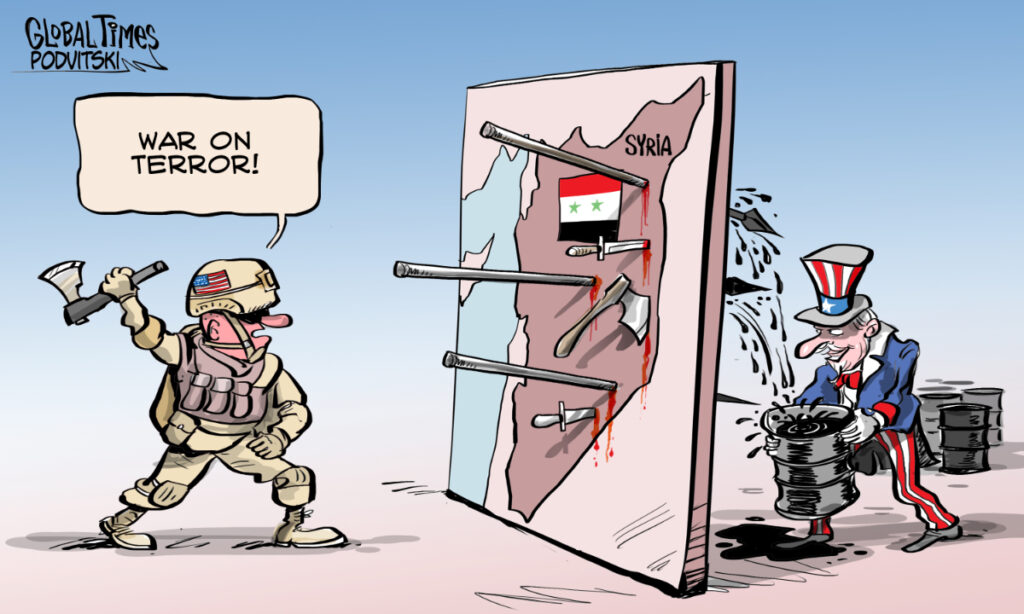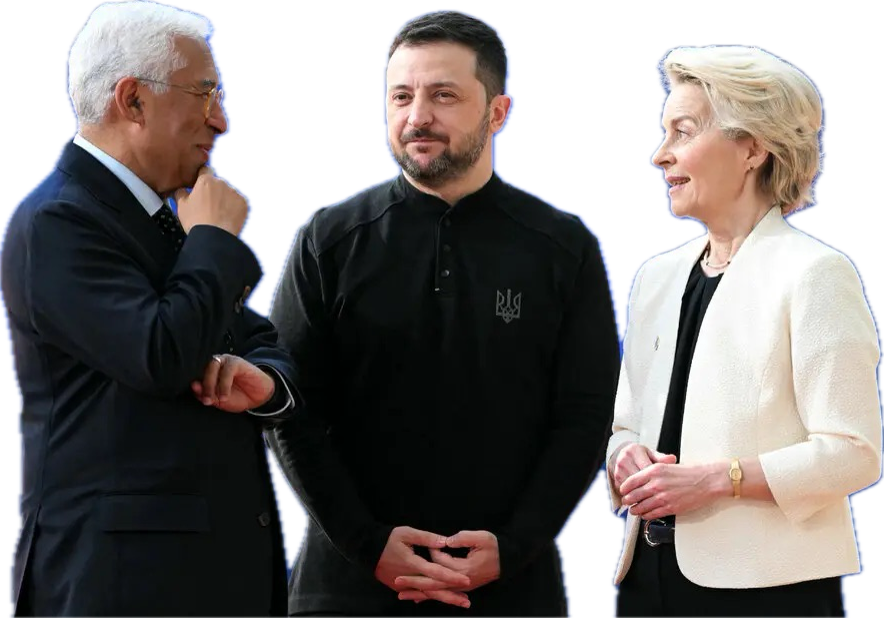Who will save the Palestinians from genocide? Nobody.
Who will save Americans from moral, political, economic, and social decay? Nobody.
Uncontrolled criminals prance around Gaza and West Bank neighborhoods, shooting whom they want, destroying what they don’t want, stealing whatever pleases them. The locals can’t interfere and the authorities have been told to protect the criminals from harm. Alarmed citizens in foreign neighborhoods organize to halt the criminality and are accused of illegal activity against the criminals, who are portrayed as victims. The appointed U.S. representative to the United Nations, previously a New York congressional representative, designates students who fought courageously to halt the genocide of the Palestinian people as anti-Semites. Some students are arrested for deportation, while the serial killers continue their “benevolent” activity of depopulating the earth. Is this science fiction of a dystopian world; no this is the reality of our dystopian world.
A contradiction tells the true story.
The students demonstrating against the obvious genocide of the Palestinian people, in which Israel, who claims to represent the Jewish people, is the perpetrator, are accused of anti-Semitism, of falsely labelling the Jewish community of being involved in the genocide, and supposedly, preventing some Jews from attending class. Nothing specific in these accusations and no names mentioned. If there have been anti-Jewish occurrences, they have been few and not alarming. Miscreants among the student protestors are incidental and are not representative of the mass of protestors.
The contradiction occurs from the guardians against ant-Semitism asserting you cannot accuse all Jews of genocide because of the genocide tactics of Israel, and they accuse the protestors of being “Hamas managed” because a few of the student protestors may incline to favor Hamas. Adding to the contradiction is that labelling an organization, which notable and credible persons consider a “resistance organization,” and has never committed a terrorist action against the United States, is arbitrary and not a considered action. Not allowing people to express thoughts that do not violate laws or harm the American people is not thoughtful guidance; it is thought control, a perversion of the U.S. constitution. Giving more importance to a few Jews who could not attend class (Is this true?) rather than giving attention to the genocide of a population is demented.
We realize the enormous problem the Palestinians have to survive the onslaught; we do not realize that this is a problem, a punishing and challenging problem, but is not the problem. The problem is the Zionist Israelis and their followers, who arm the murderers, steer the masses to accept criminally insane activities, determine our present, and command our future. Who are they and why do we have them determine our lives?
If, at the end of the 19th century, a Jewish person was asked, “What does it means to be a Jew?” most would have stumbled over the question. At that time, a preponderance of Jews considered themselves “secular,” an expression that meant they did not want to be Christians or atheists. These Jews were mostly humanists, “a progressive philosophy of life that, without theism or other supernatural beliefs, affirms our ability and responsibility to lead ethical lives of personal fulfillment that aspire to the greater good” – American Humanist Association. Beneath the cloudy skies, there were reform Jews, Reconstructionist Jews, conservative Jews, orthodox Jews, ultra-orthodox Jews, and people who called themselves Jews by heritage. Zionist Jews made its entrance upon a disparate crew of worshippers and non-worshippers.
Unlike other Jews who had interpretative connections to Judaism and positive reasons for expressing their alliance with Judaism, the Zionists had no connection to Judaism’s doctrines and an entirely negative approach. Their outlook that the Jews were a people who needed to be united in a nation, were subjected to cruel anti-Semitism that had no vindication, and only they knew the path to Nirvana did not agree with knowledge and attitudes of the 19th century Jewish community.
A people is “a body of persons that are united by a common culture, tradition, or sense of kinship, that typically have common language, institutions, and beliefs, and that often constitute a politically organized group.” The late 18th century Jews, who lived in different countries, spoke different languages, and had different customs and histories did not fit the description. At the end of the 19th century, life was not perfect for European Jews (nor for anyone else), but they had made tremendous economic, social, and political gains, and the trend continued positive. With Jews represented in educational institutions and government positions, becoming well known in all cultural representations — music, art, theatre, and writing — and managing to become successful wage earners in many avenues of employment, the Zionist case that “Jews could never satisfactorily integrate into western nations” became more dubious with each passing day.
Despite a century of repetition and recitation, little evidence exists of extensive deadly attacks on Jews in the late 19th century, during the era of incipient Zionism. A few isolated groups in France and Germany accused Jews of attempting to dominate the economy and culture. Due to these reason, some attacks occurred early in the century in Germany (Hep-Hep riots). Other happenings, which related to exaggeration of acts by Jews and the assassination of Czar Alexander II in 1881, occurred later in Russia. The YIVO Encyclopedia of Jews in Eastern Europe, an English-language reference work on the history and culture of Eastern Europe Jewry, prepared by the YIVO Institute for Jewish Research and published by Yale University Press in 2008, relates,
Anti-Jewish violence in the Russian Empire before 1881 was a rare event, confined largely to the rapidly expanding Black Sea entrepot of Odessa. The first Odessa pogrom, in 1821, was linked to the outbreak of the Greek War for Independence, during which the Jews were accused of sympathizing with the Ottoman authorities. Although the pogrom of 1871 was occasioned in part by a rumor that Jews had vandalized the Greek community’s church, many non-Greeks participated, as they had done during earlier disorders in 1859.
The pogroms of 1881 and 1882, which occurred in waves throughout the southwestern provinces of the Russian Empire, were the first to assume the nature of a mass movement. Violence was largely directed against the property of Jews rather than their persons The total number of fatalities is disputed but may have been as few as 50, half of them pogromshchiki who were killed when troops opened fire on rioting mobs.
In all of Europe, from what I have been able to confirm, less than 100 Jews were killed and possibly a few thousand were injured in anti-Jewish riots during the 100 years of the 19th century that witnessed the establishment of political Zionism. For context, compare those figures to two other atrocities during that time, which may be exaggerated and are rarely mentioned.
Circassia, Caucasus 1864-1867, 400,000-1,500,000 perished or deported.
Armenians, Turkiye, 1894-1896, 100,000 Armenians killed in Hamidian Massacres.
The Zionist game plan in the late 1800s made no sense. Why would Western Jews, whose principal problem was verbal abuse from a few detractors, want to leave industrial nations and go to an unknown place and deprived area that had nothing to offer, except prevention by the local authorities and animosity by the local inhabitants? The East European Jews lived in difficult surroundings but had an escape route ─ from 1881 to 1914, more than 2.5 million Jews migrated from Eastern Europe. Of these, about two million reached the United States, 300,000 went to other overseas countries, and approximately 350,000 chose Western Europe.
During the time that 2.5 million East European Jews migrated to Western nation, only 30,000 of them travelled to Palestine and 15,000 returned. It would take a century, if possible, to accommodate millions of new arrivals to Palestine. If the Zionists wanted to relive pressure on East European Jews, why didn’t they finance immigration to the United States? They’ll say that history proved them correct. Seems so, but not so; fortuitous events and plain luck enabled their agenda.
From its beginnings to start of World War I, Zionism proved a stagnant adventure. During that period, about 80,000 Jews came to Palestine, not all of whom were Zionists, many being adventurists, utopian Socialists, and some seeking opportunities. By 1918, only about 60,000 remained. World War I conveniently destroyed the Ottoman Empire, and the mysterious Balfour Declaration revived the Zionist adventure. In addition, the League of Nations’ certification of the British Mandate in Palestine prevented the formation of a national Palestinian governing body and provided opportunities for English speaking European Jews to work in the British administration. Suddenly, there was no longer an impediment for Jews to enter Palestine. They came with the blessings of a Balfour Declaration that certified their validity and protection by his Majesty’s forces. From 1918-1922, approximately 24,000 Jews arrived in Palestine.
The year 1924 was more fortuitous for the Zionists. The US Immigration Act closed the doors to mass Jewish immigration from East European nations and this Act steered Jews to Palestine. By 1931, Palestine housed 175,000 Jews. Did they arrive as Zionists or to seek an improved economic situation from their depressed surroundings? In the 1930’s, and until the end of World War II, Nazi persecutions of the Jews drove more than 60,000 German Jews to immigrate to Palestine (about 280.000 German and Austrian Jews migrated to other places, with about 125,000 managing to come to the to the United States).
Revelations of the Holocaust and plight of Jewish refugees after World War II gained worldwide sympathy for the Zionist cause and propelled more immigrants to Palestine. The Cold War provided the most decisive benefit for Zionism ─ the Soviet Union support for an Israeli state drove the United States to compete for Zionist attention. Votes from both nations and a few bribes provided a narrow passage of United Nations Declaration 181 and established the Zionist state, one of the darkest days in world history.
The rest is history, and that history is one of constant attacks on Palestinians, expropriation of their lands, ethnic cleansing, apartheid, oppression, battles between Israel and its adversaries, which Israel always won and from which it was able to expand its initial territory and dominate the original inhabitants of the Levant; not a proud outcome for Theodore Herzl, who, in his 1903 novel, Altneuland,
….did not foresee any conflict between Jews and Arabs. One of the main characters in Altneuland is a Haifa engineer, Reshid Bey, who is one of the leaders of the “New Society.” He is very grateful to his Jewish neighbors for improving the economic condition of Palestine and sees no cause for conflict. All non-Jews have equal rights, and an attempt by a fanatical rabbi to disenfranchise the non-Jewish citizens of their rights fails in the election which is the center of the main political plot of the novel.[
The Zionist assumptions that the Jews were a people who needed to be united in a nation, were subjected to cruel anti-Semitism that had no vindication, and that only they knew the path to Nirvana have proven to be paranoid, diabolical, and senseless.
A new people
The Middle East and North African Jews who came to Israel were Arabs; the Ashkenazi were European; the Beta Israel were Ethiopians; and the Yemenites were from the Arabian Peninsula. Israel replaced the different languages, dialects, music, cultures, and heritage of these ethnicities with unique and uniform characteristics, and created a new people, the Israeli Jew, who spoke a new language, modern Hebrew. Reshef, Yael. Revival of Hebrew: Grammatical Structure and Lexicon, Encyclopedia of Hebrew Language and Linguistics, (2013) reveals.
While Modern Hebrew is largely based on Mishnaic and Biblical Hebrew, as well as Sephardi and Ashkenazi liturgical and literary tradition from the Medieval and Haskalah (18th century Jewish enlightenment) eras, and retains its Semitic character in its morphology and in much of its syntax, the consensus among scholars is that Modern Hebrew represents a fundamentally new linguistic system, not directly continuing any previous linguistic state, being a koine language (dialect) of the same language, based on historical layers of Hebrew, as well as incorporating foreign elements, mainly those introduced during the most critical revival period between 1880 and 1920, as well as new elements created by speakers through natural linguistic evolution.
Destruction of centuries-old Jewish history and life in Tunisia, Iraq, Libya, and Egypt accompanied the creation of a new people. The Zionists, who complained about the persecution of Jews, wiped out Jewish history, determined who was Jewish, and required all Jews to shed much of their ancestral characteristics before they could integrate into the Israel community. The significance of the construction of a new Jew, in contrast to the reconstruction of an ancient Jew, has been given scant attention. The shaping of a new Jewish mind from a central educational source has distorted a population that previously had no central control and can no longer control individual destiny.
Jews were the principal victims of the Nazi regime, and the Zionists have consistently publicized atrocities committed upon the Jews by their Nazi executions. The same Zionists, in their attempts to dominate the Palestinians, have adopted the Third Reich tactics they exposed and condemned. The evils of Nazism — separation of ethnicities, virulent nationalism, irredentism, constant warfare, racist laws, killing of opposition, punitive measures after an attack, ethnic cleansing, indoctrination of the young, and genocide are in the Zionist handbook and have been conveniently brushed away by Israel’s propaganda artists. The atrocities committed by the Nazi regime have earned their followers the adjectives of deranged and insane. Atrocities by the Israeli regime and its worldwide followers are lightly treated and tacitly supported by western nations and peoples. No epithets to their violent actions are applied. If this is a state that the Jews desire, a state built on oppression of other people, theft of their lands, and now an intentional genocide, then the Jews cannot escape the enmity of the world.
Conclusion
The real problem, which devours the Palestinians, is a Zionist movement that is irrational and demented. The ferocity and sadistic war against the Gazan people is the most cruel and unnecessary action against a people during modern times. Only the demented would follow up that war by reinvigorating it at a more escalated scale. We can understand the mentality that dictates the sadism by regarding expressions from Zionist leaders, a few of dozens. No rational leader or normal person would utter these disgusting words.
“One million Arabs are not worth a Jewish fingernail.” —Rabbi Yaacov Perrin, New York Times, Feb. 28, 1994.
“The Palestinians are like crocodiles.” —Prime Minister Ehud Barak, Jerusalem Post, August 30, 2000.
“They are beasts walking on two legs.” —Prime Minister Menachem Begin, in a speech to the Knesset, New Statesman, June 25, 1982.
“We shall use the ultimate force until Palestinians come crawling to us on all fours.” —Deputy Prime Minister Rafael Eitan.
“[When we build settlements] Arabs will only be able to scurry around like drugged cockroaches in a bottle.” —Deputy Prime Minister Rafael Eitan
“We shall reduce the Palestinians to a community of woodcutters and waiters.” —Prime Minister Yitzhak Rabin, 1960, The Arabs in Israel.
“There is a huge gap between us and our enemies not just in ability but in morality, culture, sanctity of life, and conscience.” —President Moshe Katsav, Jerusalem Post, May 10, 2001.
Trying to talk honestly, operate fairly, and cooperate with the irrational and demented is an almost impossible task. Talk of two-states, one state, and relieving the genocide goes nowhere. Even the academic analysis that indicates this is settler colonialism, of which there are elements, does not lead anywhere and may lead astray ─ the Western nations, to whom the Palestinians appeal, are not likely to admit to participation in settler colonialism. Best not to antagonize them. Settler colonialists need a reason for their voyages — free land, ample resources, and colonial protection. Palestine did not provide any of these ingredients for the original settlers. Palestine only provided Palestinians, waiting to be destroyed.
The complacent world does not realize the immensity of the problem. Political, social, and economic life has been skewed by a control that dominates information and thought. The Ill equipped and easily manipulated are elected to highest political offices, partisan politics rules, and economic divide grows. Those, who have much, gain more; those who gain more dictate more. Defeat of Zionism is an international priority and can be done if the populations prioritize. If not ─ Nobody Saves the World. The demented command the future.
The post Nobody Saves the World first appeared on Dissident Voice.This post was originally published on Dissident Voice.













